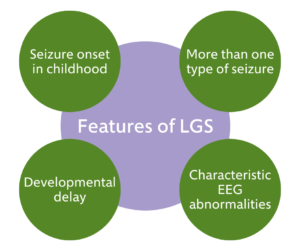For Healthcare Professionals
 It is with the help of our dedicated neurologists, epileptologists, neurosurgeons, and neuroscientists that our children have been diagnosed quicker and more efficiently to provide them with access to information on potential treatment options.
It is with the help of our dedicated neurologists, epileptologists, neurosurgeons, and neuroscientists that our children have been diagnosed quicker and more efficiently to provide them with access to information on potential treatment options.Could it be Lennox-Gastaut Syndrome (LGS)?
LGS is one of the Developmental and Epileptic Encephalopathies (DEEs) and frequently evolves from early-life epilepsy (a brain disorder characterized by seizures). The abnormal brain waves seen in LGS are a sign that typical brain development has been disrupted and once the abnormal LGS brain network forms in a child, it is extremely difficult to get seizure control and to learn. Over time, LGS becomes neurodegenerative and most die before their time.

Nobody is born with LGS; it develops over time from childhood seizures that remain uncontrolled by treatments and from brain injury. In LGS, seizures usually begin in the pre-school years, and LGS usually emerges between 3 to 5 years of age. LGS can, however, start later in childhood.
ICD-10 Codes for Lennox-Gastaut Syndrome
Having the appropriate coding in a patient’s medical record may also make it easier to secure coverage for indicated medications and medical testing required for recognized co-morbidities of the disease. And, without a specific ICD-10 code, it is difficult to track how many people have the disease and where they are located. If patients are not being properly coded, we might not be accurately tracking all of the characteristics of the disease, as well as assuring that patients are receiving appropriate care.
Professional Resources
Learn More About Clinical Trials for LGS
Learn About Cure LGS 365 Research Grants
Submit a Request to Join
- Get information about LGS
- Learn about support for families
- Learn how to provide the best care
Join the LGS Professionals Connect Group
Learn More About Our Support Community
To qualify as an LGS Comprehensive Care Center, the center is expected to:
- Offer a multidisciplinary approach for the treatment of Lennox-Gastaut Syndrome
- Have a high concentration of expertise and related resources centered on LGS
- Demonstrate a strong knowledge base and familiarity with LGS
- Commit to furthering clinical knowledge of LGS through collaboration with others, including the LGS Foundation
- Have involvement in studies and/or clinical trials for Lennox-Gastaut Syndrome and are knowledgeable about new treatments and cutting-edge research.
